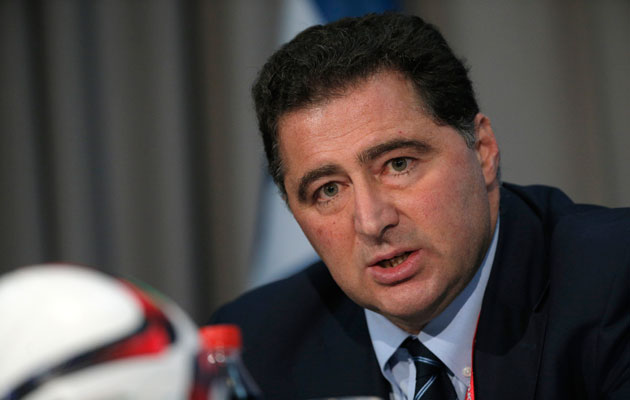The battle within FIFA for reform of the scandal-scarred world football federation burst into the open today with publication of a 25-page recipe for change by Domenico Scala.
The Swiss businessman was brought in three years ago as independent chairman of a new audit and compliance committee. He has always wanted more substantive change than Sepp Blatter and the executive committee could accept and compiled his recommendations in the wake of the president’s decision to step down.
However Scala was then outflanked when Blatter’s executive committee created a reform committee packed with its own delegates. Scala duly outlined his proposals early this month to this latest task force and its chairman, Swiss lawyer Francois Carrard.
Whether some or any of his ideas will see the light of day is uncertain. So today Scala seized the initiative by publishing his own report and talking about it at length in two news conference calls.
By airing his ideas in public he may add further pressure to the demand for reform from outside FIFA and weighing on not only the task force but FIFA’s senior directors, six confederations and 209 member associations.
Key proposals
Scala’s eight key proposals range from term limits and pay transparency to enhanced integrity checks and restructuring of the executive committee so as to wipe away the conflict of interest, opportunities and temptations to blame for events during much of the past corruption-tainted decade.
However Scala is not a member of the reform committee. This will make its own recommendations in December for the executive committee to decide which proposals should be put before the extraordinary elective congress next February 26.
This congress will also choose a presidential successor to Blatter which has raised questions about whether reform and presidential ballots should be undertaken at the same time.
Scala – who said he “did not even know what FIFA was” before being involved by previous governance guru Mark Pieth – insisted this was the correct path bearing in mind the circumstances in which FIFA found itself.
He said: “The organisation [of events] cannot work in sequence with first a presidential election and then reform. [It] is in a situation where these things need to happen in parallel.”
Scala expressed his disappointment that contenders to succeed Blatter – including UEFA president Michel Platini, South Korean Chung Mong-joon and former Asian FIFA vice-president Prince Ali of Jordan – had not addressed reform in specific terms, only in platitudes.
‘Empty words’
He said: “We hear people talking about reforms with sometimes very little substance . . . We have a lot of empty words like ‘more transparency, better governance, more democracy’. These are nice words but we need to articulate what it means.”
Overall, said Scala, FIFA had been “a success story” with football established as the world’s No1 sport, the phenomenal popularity of the World Cup every four years and the vast sums generated for the development of the game.
However, he added: “Rapid growth leads to management problems and conflicts of interest and these have affected FIFA as with issues such as the decisions in 2010 on the double award of the World Cup for 2018 and 2022.”
Reform work between 2011 and 2014 had achieved limited progress with a change in the World Cup award system, improved transparency, tighter auditing systems and the creation of an independent ethics chamber. However all of this was not enough.
Scala’s eight-point plan proposes:
1, Enhanced integrity checks undertaken by the FIFA Ethics Committee for all exco members and prospective candidates;
2, Term limits to a maximum of three four-year terms for the president, exco members, secretary-general and members of independent committees;
3, Direct election of FIFA exco members by Congress from proposals by the confederations;
4, Full pay package disclosure for the president, exco members, secretary-general and chairs of the independent committees (with other football-related income also declared to the remuneration committee);
5, ‘Increased efficiency and enhanced independence’ for the main committees, meaning independent chairs;
6, Higher governance standards for confederations and FAs without which they cannot propose individuals for senior FIFA roles;
7, Revised World Cup bidding rules and procedures (already enacted including obligation for would-be hosts to meet United Nations standards on labour conditions and human rights);
8, Internal structural improvements to separate strategy from decision-making (ie with regard to commercial decisions) by splitting exco responsibilities between a ‘corporate system’ governing body and management board.
FIFA, Scala warned, had reached a “watershed” point as far as public reputation and perception were concerned.
Public opinion
He said: “If FIFA does not move then public opinion will not change. This is not only about the change of the presidency, there are systemic issues which need to be addressed. We need these reforms now, we cannot wait.
“I do believe that, with these reforms, this is a good chance to improve the perception and public opinion. FIFA, operationally, works very well so the machine is very effective. It has not come to a halt. But this is a watershed in terms of FIFA going forward.”
Limited time means it is unlikely the exco in December will propose a full range of reform proposals to congress in February. Scala considered terms limits “the most important of the ‘easy’ ones.”
Point eight, concerning restructuring the executive committee, was the most challenging. Scala explained: “This is more complicated because it requires far more understanding and conviction at the level the people affected but you have to separate oversight and strategy from day to day operation. This is at the hub.”
Whatever happens, Scala will not be accepting any blame for what is, or it not done. That lies first with the exco and then with congress.
Scala insisted: “I don’t do politics.”







